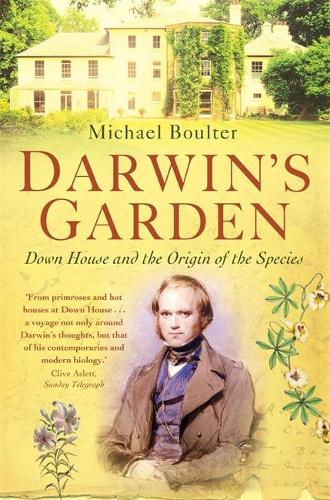
Darwin's Garden: Down House and the Origin of the Species
(Paperback)
Publishing Details
Darwin's Garden: Down House and the Origin of the Species
By (Author) Michael Boulter
Little, Brown Book Group
Constable
26th February 2009
United Kingdom
Classifications
General
Non Fiction
Evolution / Evolutionary biology
576.82092
Physical Properties
Paperback
272
Width 127mm, Height 203mm, Spine 16mm
305g
Description
Five years after returning from his trip around the world on HMS Beagle, the young Charles Darwin became the owner of Down House in Kent, where he moved his growing family, far away from the turmoil and distractions of London. He would live here for the rest of his life. It would become the place where he began work on his masterpiece On the Origin of Species.
For almost twenty years he used the garden around him as his laboratory. In the orchard he conducted experiments on pollination. He built a dovecot where he could breed new strains of pigeons that helped him understand the questions of generation. On his daily walk along the sandbank he observed how plants competed for survival. In his heated greenhouse he conducted experiments on orchids and primulas. In solitude he was also able to struggle with the ideas of evolution that had haunted him since his voyage, and give him the courage to publish his revolutionary new ideas. Bringing Darwin's garden to the present day, Boulter unfolds a shining portrait of the formation of one of England's greatest thinkers and his relationship with the place he loved and shows how his experiments that he conducted over 150 years ago are still revealing new proofs and revelations as we continue to search for the origins of life.Reviews
An engaging and fascinating tour through the life and work of Darwin, and what Darwin's legacy means for our view of the world.
An absorbing book. From the primroses and hot house at Down House [Boulter] leads us on a voyage around not only Darwin's thought, but that of his contemporaries and modern biology. - Sunday TelegraphA useful primer for anyone wanting an overview of the man and his legacy. - New ScientistBoulter has been able to show a side of Darwin which will surprise many. - Daily MailFascinating and evocative. - Catholic HeraldAuthor Bio
Previously Professor of Palaeobiology at the University of East London and head of a team analysing Fossil Record 2, the largest database of information on extinct animals and plants, Mike Boulter is a distinguished scientist. He is the author of Extinction and currently works at the Natural History Museum. He has been secretary and editor for the International Organisation of Palaeobotany for the past 20 years.
